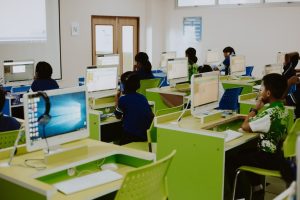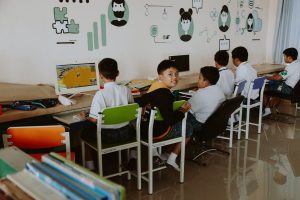
What is Social and Emotional Learning (SEL)?
Also known as socio-emotional learning, SEL is a crucial component of primary and secondary level education that encourages students to foster social and emotional skills. For example, it teaches students to develop and effectively manage emotions in positive ways.
By helping students identify and understand their emotions, they learn how to act accordingly. They also foster empathetic behaviour, which is the ability to understand perspectives that differ from their own.
SEL is designed to help students develop into well-rounded individuals with the tools they need to be successful members of society. So here are some ways we can foster social-emotional growth in our students.
Hold Class Meetings

Class meetings are an excellent way for students to express their feelings and listen to their peers share in a healthy space. During these sessions, students share their feelings and listen to others share their concerns, increasing students’ awareness of their own emotions and those of their peers.
It also allows them to understand their peers’ points of view and various perspectives. Some may call this a heart-to-heart (H2H) talk, which helps the class bond too!
Use Storytelling

Stories are a powerful medium for teaching empathy and self-awareness. Through storytelling, students learn to connect with others on an emotional level.
This is because stories help students to see the situation from different perspectives. They learn to analyse the story characters’ feelings and understand their intentions and motives. This lets your students practise their literature analytical skills too!
There are other benefits to storytelling too. According to research, sharing stories with your students can:
1. Reduce stress and anxiety
2. Build resilience
3. Regulate emotions
4. Enhance relationships
5. Creates interest in reading
6. Boosts your students brain development
Provide Opportunities for Reflection

Reflection is key to SEL in the classroom because it allows students to think about what they’re learning. So encourage your students to reflect on their work when finished with projects or assignments.
You can do this by having them fill out daily activity tickets at the end of class every day. They can write down one thing they learned that day and why it was necessary.
When you allow your students to reflect, it helps them connect what they’re learning to their life happenings. This way, they retain the information better, and they can apply their learning at home and to other areas of their daily lives.
Create Routines and Structure in Your Classroom

Setting rules for your class might seem stifling, and you might think that it limits your students’ ability to demonstrate social and emotional skills. But routines and structures give them a safe space to practise their self-management and interpersonal skills.
Having a routine means that your students have a better idea of what is expected of them during the lesson. Meanwhile, when you have a classroom structure, it facilitates appropriate social interactions among your students.
Create an Environment That Fosters Trust

Creating a safe environment for your students to feel secure when sharing their feelings and thoughts is vital for effective SEL.
If they don’t feel safe or if they don’t trust you and their peers, they won’t feel confident enough to express their thoughts and feelings freely. They might also be resistant to constructive feedback, which prevents them from growing and improving on themselves.
Here are some ways you can create a safe environment:
1. Ensure that you handle all conversations with respect and care
2. Address any instances of disrespect, but make sure to do it gently so that you don’t further upset any student involved
3. If you notice any tension amongst your students, take steps to resolve the issue and don’t ignore it.
Practice Problem-Solving Skills

Critical thinking and problem-solving skills are essential in responsible decision making, one of the five core competencies of SEL. One way you can encourage your students to practise problem-solving skills is by encouraging independent learning.
This is when students have to find their own resources and attempt to learn on their own. This encourages them to be creative and it develops critical thinking skills too. It also develops a sense of accountability for their actions in them.
This makes them take responsibility for their actions and it also helps them to understand the ‘cause and effect’ relationship in life.
Keep a Customised Plan

Keeping a customised plan for each of your students is a great way to ensure that their SEL is effective.
Here’s how you can create an individualised plan for your students:
1. Start by identifying each student’s particular social-emotional needs.
2. Then outline how you can work towards meeting those needs.
3. Add different activities to your lesson plans (make sure to spread them out so that your activities cater to every student’s needs).
For example, if your student struggles with working with others in group activities, try adding team-building exercises to your lesson plans.
When you have an individualised plan for each of your students, you cater to their individual needs. This helps them improve because the activities are relevant to their development, and you can give them constructive feedback.
Focus on Specific Social and Emotional Skills

Soft skills like decision-making and collaboration are crucial when your students enter the workforce. But it is very difficult to attribute them to a particular subject, and it is not typically taught in the traditional curriculum.
So how do you help your student develop such skills in your classroom? Here are some tips:
1. Model for them how you would handle a situation. For example, if your child struggles with paying attention during class, show them how you would focus on what the teacher is teaching.
2. Encourage them when they try something new or take risks. It’s important for kids to feel like they can try something new without the fear of failure, so they’ll keep trying until they get better.
Create a Calm and Welcoming Classroom

One way to promote social and emotional learning is to create a classroom environment. This invites students to be their authentic selves. It also sets up a physical space where students are comfortable expressing their thoughts and emotions freely.
Here are some ways you can create a calm and welcoming classroom:
1. Add a rest corner where students can relax and spend time alone
2. Allow flexible seating arrangements
3. Make sure your classroom is well ventilated and well lit
Start Each Day with a Whole-class Check-in

Before starting your lesson, try having a daily check-in on your students. This serves as a tool for you to assess your students’ well-being and mental state for that day.
You could start it off as a casual conversation. Ask about their day, ask if they’re coping well with their studies and assignments, or you could even talk about an exciting event.
This creates a personal connection between you and your student and helps your students understand their peers’ circumstances and concerns. This encourages empathy and allows your students to bond with each other and you too!
Conclusion

Students’ social and emotional well-being is important because it contributes to their academic progress and personal development.
This is why we integrate SEL into our classes. It gives our students the opportunity to practise skills that help them manage their social-emotional needs and academic expectations.
How to Raise Globally Minded Kids without Traveling Out of Singapore
Lack of 21st Century Skills – Why Your Child Struggles at School
